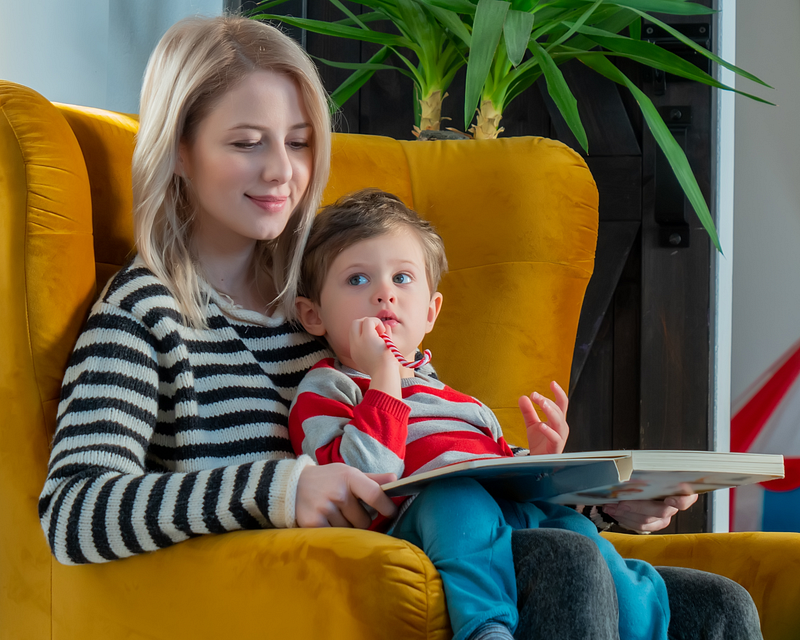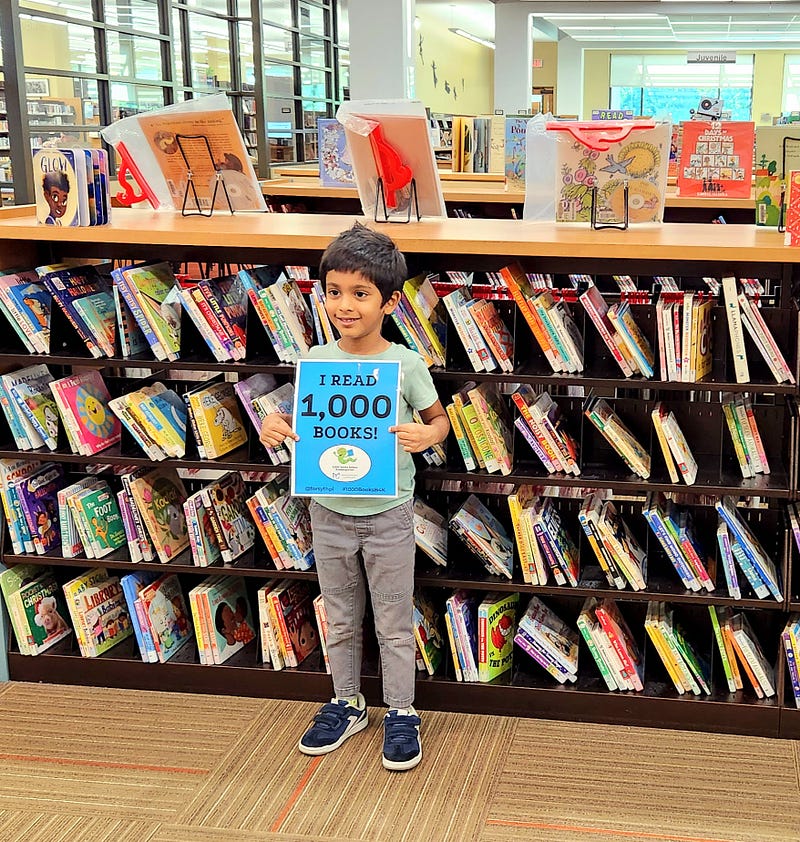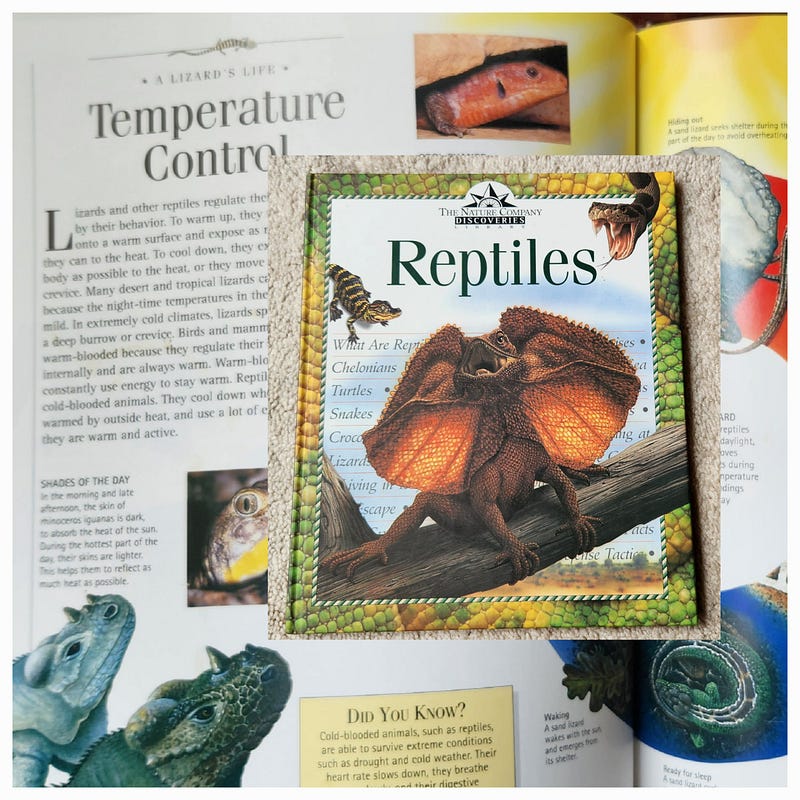Reading and Science
Neuroscience Behind Why I Read 1000 Books With My Son Before He Turned 5
Get inspired and implement the Read-Aloud strategies to revolutionize your child’s future.

Introduction: Reading Aloud is a Superpower
Reading aloud to your baby regularly and widely has unimaginable benefits. It’s a parent’s true superpower!
I serendipitously stumbled upon the book ‘The Read-Aloud Handbook,’ which opened my eyes to the magnificent benefits of reading to children from birth to three or five years.
By then, I had begun reading to my son (I started when he was three months old) and had already begun to see a fast-track development in his speech and cognition.
So, reading The Read-Aloud Handbook was like a light-bulb moment for me; every word made complete sense. The information it contained was pure gold to me. I devoured the book and other books on the same topic.
I read my son a whooping thousand books before he turned five. It did not start with this lofty goal in mind. It started with some difficult times.
I have documented that journey in great detail in this article. Make sure to read it to find out how I kept going to complete the challenge.

Along the journey, I have garnered pearls of wisdom that I find imperative to share with parents, especially new and expectant parents — because of the critical timing factor: 0 to 5 Years!
So, here are the top 10 reasons for reading to your child from 0–5 Years:
1. Increasing Connections in the Child’s Brain
Here are two facts that might astound you:
* Babies are born with about 100 billion brain cells.
* A baby’s brain makes 1 million ‘Neural Connections’ every second in the early years (0–3 years) in the different regions of the brain.
Most of the 100 billion neurons have not yet formed meaningful connections at birth. Forming and reinforcing these meaningful connections is called brain or cognitive development.
Countless research studies that are publicly available have shown that reading aloud to babies increases the neural connections in a baby's brain significantly.
This heightened brain activity leads to higher learning and development levels than babies with little or no reading experience.
One research experiment shows that —
“Picture book reading was consistently associated with increased neural activity of frontal lobes in the children.
Brain imaging studies have suggested important roles for the frontal lobes in cognitive processes such as executive function, attention, memory, socio-emotional development, and language (13–15).
Furthermore, researchers and clinicians have suggested that picture book reading is an important activity that promotes children’s language and literacy skills (1–6).”
0–5 years are crucial in the child’s brain development, which will affect them for the rest of their lives.
The stimulation they receive through reading books will forever lay a strong foundation for an enhanced and empowered brain structure with advanced neural connections.
This will prepare your child not only for the early school years but also for the rest of their lives.
See the video below where my son, though hardly an 8-month-old, has taken a liking for books and is interacting well with them already. He looks at the pictures on the page intently.
This is visual stimulation in action.
Babies love books! Give them what they love — Start Reading Early!
2. Increasing Brain Cells For Life
Dr Rekha S. Rajan says, “When you read aloud to your baby every day, your baby’s brain gets bigger!”
Recent results of studies that have been taking place over decades have shown that reading to your baby not only affects them in early life, but the effects can last a lifetime.
Dr Rajan explains:
“The connection between reading aloud and brain development is unmistakable. And the connection grows over time. We found that early life experiences, such as reading aloud to your child, are associated with improved left hemisphere brain volume and increased cortical thickness. This suggests a healthier brain through childhood, adulthood, and old age, resulting in better cognitive function in old age.”
The images from the brain study show how and where the brain shows increased volume and cortical thickness in individuals who were read to in their early years. The results show that being read to at a young age is associated with increased brain volume (inside) and cortical structure (outside thickness).
Dr Rajan has explained this in her latest book — “The Read Aloud Factor — How to Create the Habit that Boosts Your Baby’s Brain.”
“Early-life reading experiences (being read aloud to) significantly improved the outside thickness of the brain in as many as 16 regions. Reading aloud to your baby for just 20 minutes every day will help the brain grow bigger and healthier for your baby’s entire life.
That means the more often you read aloud, the better.”
Babies are fast learners.
See this video of my son when he was ten months old. He is already following the rhythms of reading a book — scanning the contents of the page, listening to my voice, and turning the page when I’m done reading the page.
It may not seem obvious, but seeing how he knows when to turn the page is amazing!
3. Building Highways in the Brain for High-Traffic Learning Later
By reading aloud to your child, you are preparing them for advanced learning experiences in the future.
See this snippet from the book How to Build Your Baby’s Brain by Gail Gross.
“Acts of love like cuddling, soothing your child with your voice, responding to her needs, and reading a book may sound simple, but they are the stimulation your baby’s developing brain needs and build upon more effectively.
The more you interact with and stimulate your baby, the more you increase his neurological cells. That increase in cells also leads to an increase in activity, and it’s easy to see how that promotes faster and more complicated patterns of thought.
You’re building the highways and infrastructure for high-traffic learning later.” — Gail Gross
My Personal Experience
I have personally experienced this as my son has been able to delve with tremendous interest into a wide range of topics from outer space to prehistoric animal life, history, inventions, Star Wars, funny fiction, the human body, and a host of other topics even before he turned 5.
The reason, I believe, is the exposure to reading at a very early age that has helped create the pathways in the brain to comprehend and learn about advanced topics.
The Book he is perusing is this one —Reptiles (Nature Company Discoveries Library)

He is not just looking at the pictures but is also reading some interesting facts that he will use in conversations later.
4. Creating a Positive and Enjoyable Reading Experience (Associate Reading with Pleasure)
Early reading experiences with a parent, grandparent, or caregiver that are positive and enjoyable go a long way. They help children to associate reading with pleasure.
This association will help them in the future to not cringe away when it comes to reading for academic purposes and also for recreation and self-development.
Here’s an example of a positive and enjoyable reading experience at a very early age of six months. My son loved these reading times. His smile and joy throughout the reading process are themselves a testament to this fact!
5. Building Your Child’s Background Knowledge
Background knowledge is what you already know about a subject or about topics closely related to the subject.
Reading Aloud to your child widely on various topics is key to a strong background knowledge.
A strong background knowledge exponentially increases the ability of a child to grasp a new topic.
For example, having read a lot about different topics related to outer space, my son could relate to the Star Wars series very easily. Although these two topics are very different in the sense that one is clearly non-fiction and the other fiction, there is an important connection.
Galactic Wars and alien planets did not seem like a very foreign or difficult concept to him when he was introduced to them, having had the background knowledge of galaxies and planets.
6. Building Advanced Vocabulary
Reading to your baby helps reduce the word gap and helps build vocabulary. According to Jessica Logan, “The word gap of more than 1 million words between children raised in a literacy-rich environment and those who were never read to is striking.”
If parents rely only on ‘conversations’ to teach their children new vocabulary, they are missing out on a large chunk of words that are not used in day-to-day conversations.
Reading will introduce them to a whole new world of words, and the difference, according to this research, is astounding:
Based on the calculations from this study, here’s how many words kids would have heard by the time they were five years old:
Never read to — 4,662 words
1–2 times per week — 63,570 words
3–5 times per week — 169,520 words
Daily — 296,660 words
Five books a day — 1,483,300 words
My Personal Experience
Here’s an example of my son being read to by his dad. In this video, he is not even two years old yet, one month short of it. And still, he is finishing off the sentences his dad is reading.
The point to note here is that at such an early age, he has picked up and added words to his vocabulary like — fierce, grumpy, scary, jumpy, perfect, etc., which would not have been a part of the daily conversations with a child.
This quote from The Read-Aloud Handbook makes a significant statement that parents and teachers should note -
“There is one skill that matters above all others because it is the prime predictor of school success or failure: the child’s vocabulary upon entering school. Yes, the child goes to school to learn new words, but the words he or she already knows determine how much of what the teacher says will be understood.
And since most instruction for the first four years of school is oral, the child who already has the largest vocabulary will understand the most, while the child with the smallest vocabulary grasps the least.”
7. Providing a Reading Role Model
Jim Trelease, in The Read-Aloud Handbook, says:
“Neither books nor people have Velcro sides– we don’t naturally attach to each other. In the beginning, there must be a bonding agent– a parent, relative, neighbor, teacher, or librarian–someone who attaches the child to a book.”
Parents know quite well that imitation can be a two-edged sword. There are some good habits that you might have that you will love if your child imitates. And then there are some scary ones that they have imitated that you wish they hadn’t learned.
Reading is one of the good ones. Reading to your child will reinforce it as something they might want to do. That will be a good example of sustaining this habit for life.
8. Laying the Foundations of Life-Long Reading and Learning
Initially, we begin by reading simple storybooks that act like hooks.
The attention and time the baby receives from the parent, along with the reassuring sound of their familiar voice, all add up to making reading pleasurable.
This lays the foundation for seeing reading and learning as a way of life.
You do not have to struggle very much to create an interest in reading and learning newer subjects.
The interest is already there — created by you when you had the baby propped up in your lap chewing on board books while you pushed through just one more book.
9. Groundwork for Learning to Read Themselves
Eventually, with the tons of books you read, there will come a time when the kiddo will want to do it themselves.
It often starts with the kids pretending to read while sounding out the words of their favorite book from memory.
But slowly and with your help with phonetics and sounds of letters and sight words, etc… they will pick up reading themselves.
The age they do that varies for different kids, but having heard a lot of words through the read-aloud definitely boosts the reading progress.
My Personal Experience
Here’s an example of my son when he was just beginning to experience the joys of reading himself. He is two weeks short of three years in this video.
He knows some words by memory, but many of them he can recognize here. His joy when he reads those familiar words says it all.
10. Promoting these 7 Key Developmental and Social-Emotional Skills —
i. Concentration
If you start early, the baby eventually develops the habit of sitting through many books in one sitting. This will translate into better concentration in the future.
ii. Speech Development
The child's listening vocabulary feeds into his speaking vocabulary in the future. The more words a child has heard earlier in the developmental process, the better the speech development will be.
iii. Complex Thinking
Although baby books seem simple, the good ones will help the baby to think and relate. Similar topics will help repeat the ideas and create a pattern of co-relating ideas, thus developing complex thinking.
iv. Creativity
Ideas from books spill over into many other areas of the lives of babies and children, like their play, writing, speech, etc., thus promoting creativity in learning and play.
v. Curiosity
Reading books creates a hunger in the children to learn about new topics and increases their curiosity about the world around them and about life. It creates a loop of increased learning and curiosity about newer topics.
vi. Imagination
Stories from folklore, fantasy, superhero stories, and all other kinds of stories help to build the children's imagination. It helps to build their imagination for problem-solving in various other areas of their lives.
vii. Emotional Intelligence
Good books promote stories that help the children to relate to the characters. They help the children think from the character's point of view. It helps build empathy and strengthen their emotional intelligence.
Conclusions
Reading to your baby is your superpower as a parent.
I introduced ten powerful reasons for the importance of reading to your baby with evidence, research, and my personal experience with my child.
The advantages of reading to your child are enormous, from enhanced brain development to learning to read to becoming lifelong learners.
I hope this story inspires you to read more to your child or to share this information with a new or expectant parent so that they take advantage of this superpower to change their children's lives forever.
Thank you for reading my story.

This story contains affiliate links to books. I earn a small commission if you buy the books with those links.





